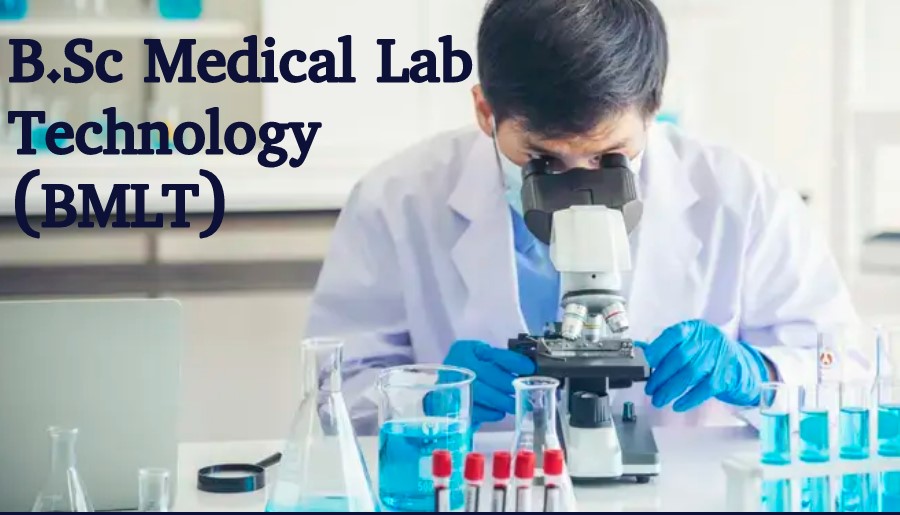BSc Medical Lab Technology (BMLT) is a three-year, plus one year or six-month internship undergraduate paramedical program that is designed for the diagnosis, treatment, and prevention of disease by using clinical laboratory tests. Throughout the course, students learn the basics of testing, detecting, diagnosing, and treating disease. In addition, students learn to gather information, take samples, test, report, and proper documentation of these investigations.

Overview of the Program
A BSc in Medical Laboratory Technology is a four-year program that trains students to become medical laboratory technologists. It covers:
- Core Sciences: Students learn biology, chemistry, and math to understand the human body and lab testing principles.
- Lab Techniques: They acquire skills for collecting, processing, and analyzing clinical specimens.
- Instrumentation: Proficiency in lab equipment operation and maintenance is emphasized.
- Clinical Pathology: Students study areas like haematology, clinical chemistry, microbiology, and immunology.
- Quality Assurance: Training in maintaining test accuracy and safety is crucial.
- Ethics and Regulations: Students learn about the ethical and legal aspects of lab medicine.
- Research: Some programs offer research opportunities.
- Clinical Internship: Hands-on experience in healthcare settings.
- Communication and Professionalism: Developing effective communication and professionalism.
- Continuing Education: Encouragement for ongoing professional development.
Core Courses
Core courses in a BSc Medical Laboratory Technology program cover a range of clinical laboratory science topics. Here are some key courses:
- Anatomy and Physiology: Study of the human body’s structure and function.
- Microbiology: Examination of microorganisms and their role in diseases.
- Clinical Chemistry: Analysis of chemical composition in bodily fluids.
- Hematology: Examination of blood and blood disorders.
- Immunology and Serology: Study of the immune system and serological testing.
- Clinical Microscopy: Techniques for examining body fluids and cells under a microscope.
- Medical Laboratory Techniques: Hands-on training in lab procedures and safety.
- Medical Genetics: Understanding genetic principles and their relevance to diseases.
- Clinical Pathology: Overview of clinical pathology disciplines.
- Clinical Immunohematology (Blood Banking): Focus on blood transfusions and compatibility testing.
Specialization Options
- Bachelor of Science (BSc) in Medical Laboratory Technology program, students have the opportunity to specialize in various areas to align their education with specific interests and career aspirations. One common specialization is Clinical Chemistry, where students delve into the intricate analysis of chemical components within bodily fluids, enabling them to diagnose and monitor metabolic disorders and conditions like diabetes.
- Another compelling option is Microbiology and Virology, focusing on the identification and examination of microorganisms, including bacteria, viruses, and fungi, crucial for diagnosing infectious diseases. Haematology and Hematological Disorders specialists concentrate on blood and its components, diagnosing disorders such as anemia and leukemia.
Clinical Training
- Clinical training is a crucial part of healthcare and medical education, which includes Medical Laboratory Technology. It’s palms-on mastering in actual healthcare settings like hospitals or clinics.
- During clinical education, students work under supervision, applying schoolroom expertise to responsibilities like coping with affected person specimens, interacting with sufferers, and performing diagnostic exams.
- It guarantees practical talents and trouble-fixing skills, and c emphasises affected person safety and confidentiality.
Conclusion
In conclusion, Medical Laboratory Technology is a crucial area of healthcare, playing an important role in disorder analysis and patient care. A Bachelor of Science (BSc) software in Medical Laboratory Technology provides students with comprehensive training in laboratory technological know-how, protecting core subjects like anatomy, microbiology, medical chemistry, and more.
Graduates have the possibility to concentrate on numerous areas, enabling them to pursue precise career paths in medical laboratories, research, or healthcare management.
FAQs About BSc MLT
In a BSc MLT program, students learn about laboratory techniques, specimen collection, analysis of biological samples, instrumentation, clinical pathology, quality control, and ethical considerations in the field of medical laboratory technology.
Prerequisites can vary by institution, but typically include a high school diploma or equivalent, with a strong foundation in biology, chemistry, and mathematics.
A BSc MLT program usually takes four years to complete, but the duration may vary depending on the institution and country.
Yes, many BSc MLT programs offer specialization options. Common specializations include clinical chemistry, microbiology



















